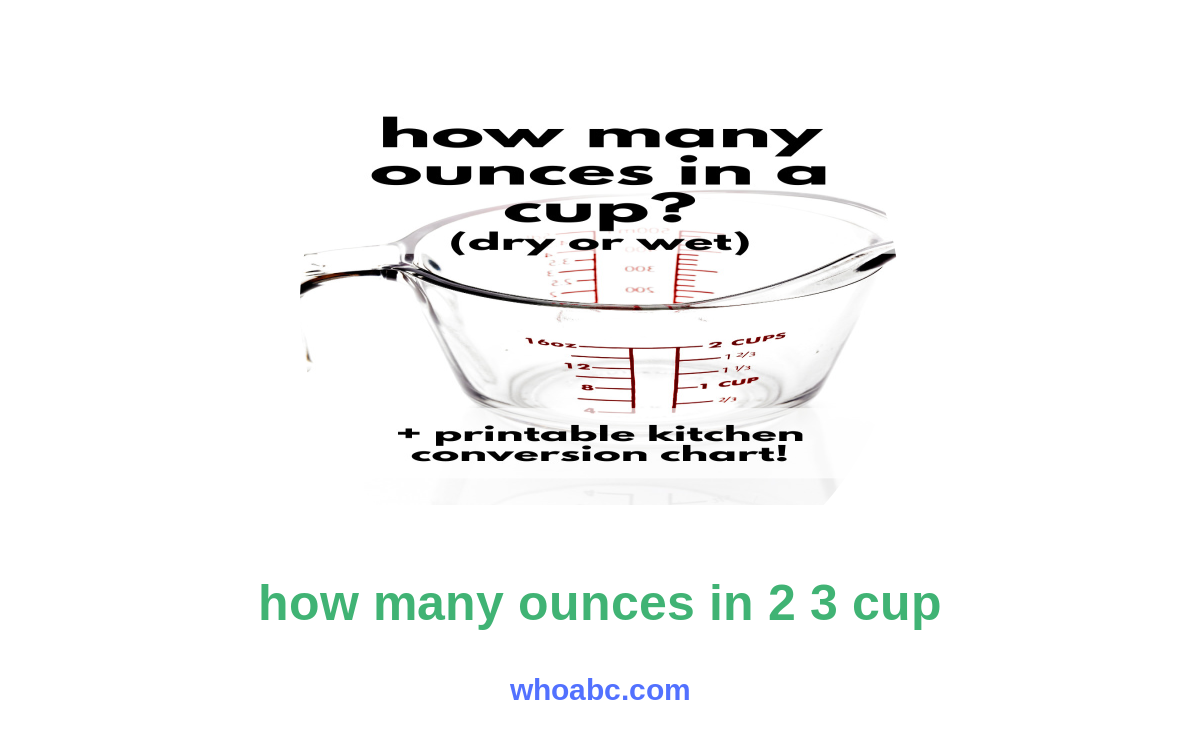Unlock the Mystery: Discover the Perfect Conversion - How Many Ounces in 2/3 Cup?
This page for Unlock the Mystery: Discover the Perfect Conversion - How Many Ounces in 2/3 Cup?.

Unlock the Mystery: Discover the Perfect Conversion - How Many Ounces in 2/3 Cup?
Welcome to our comprehensive guide on one of the most common kitchen measurement conversions: how many ounces are in 2/3 cup?
Understanding the Basics: Exploring the Conversion Factors for Ounces and Cups
Before diving into the specific conversion for 2/3 cup to ounces, let's take a moment to understand the fundamental conversion factors between ounces and cups.
An ounce is a unit of weight or mass, while a cup is a unit of volume. In the context of cooking and baking, we typically measure ingredients by volume using cups, tablespoons, and teaspoons. Understanding the relationship between weight and volume is crucial for accurate conversions.
Converting Your Measurements: A Step-by-Step Guide to Calculate Ounces in 2/3 Cup
To convert 2/3 cup to ounces, we need to consider the specific ingredient being measured. Different ingredients have different densities, which affect their weight-to-volume ratio. However, as a general guideline:
Step 1: Determine the density or average weight per cup of the ingredient in question. This information can often be found on the product packaging or through reliable culinary resources.
Step 2: Multiply the density by 2/3 to get the weight in ounces. For example, if the average weight per cup is 8 ounces, the calculation would be: 8 ounces/cup * 2/3 = 5.33 ounces.
Keep in mind that some ingredients, like flour, may require a different conversion factor due to varying factors like humidity and packing methods. Consulting reliable conversion charts or online tools can provide more accurate calculations based on specific ingredient types.
Common Mistakes to Avoid: Troubleshooting Conversion Errors and Accurate Results
While performing conversions, certain mistakes are commonly made. By being aware of these pitfalls, you can ensure accurate results:
Mistake 1: Mixing up weight and volume measurements. Always double-check whether the given measurement is in ounces or cups, and apply the appropriate conversion formula accordingly.
Mistake 2: Not using the correct density or average weight per cup for the specific ingredient. Always consult reliable sources for accurate conversion factors.
Mistake 3: Using inaccurate measuring tools. Invest in reliable measuring cups and spoons to ensure precise measurements.
Practical Tips and Tricks: Simplifying the Equation to Determine Ounces in 2/3 Cup
While the step-by-step method outlined in section 2 provides accurate results, there are a few shortcuts you can take for quick conversions:
Tip 1: Familiarize yourself with common ingredient conversions. Memorizing conversion factors for frequently used ingredients, such as water (8 ounces/cup), can save time and effort in the kitchen.
Tip 2: Utilize online conversion tools and mobile apps. These resources often have pre-programmed conversion factors for a wide range of ingredients, making conversions a breeze.
Beyond the Numbers: How Understanding Measurement Conversion Enhances Baking and Cooking Skills
Mastering measurement conversions not only ensures accurate recipes but also enhances your overall culinary skills. Here's why:
Achieving Consistency: Precise measurements help maintain consistency in recipes, resulting in consistently delicious dishes.
Recipe Adaptation: Converting ingredient quantities allows you to adapt recipes to serve a larger or smaller number of people without compromising taste and texture.
Creative Freedom: Understanding conversions empowers you to confidently experiment with ingredient substitutions, creating unique and personalized dishes.

Video about how many ounces in 2 3 cup
Some question and answer of how many ounces in 2 3 cup
How many ounces are in 2/3 cup?
There are approximately 5.33 ounces in 2/3 cup.
Conclusion
In conclusion, unraveling the mystery of how many ounces are in 2/3 cup has shed light on an essential kitchen conversion that can elevate our culinary endeavors. Through a step-by-step exploration, we've learned that the answer lies in the understanding that 1 cup equals 8 fluid ounces. Armed with this knowledge, we can confidently convert 2/3 cup to 5.33 fluid ounces, allowing us to achieve precision and accuracy in our recipes. So, the next time you find yourself in the kitchen, remember to unlock the mystery and confidently measure your ingredients, ultimately creating sensational dishes that delight both your taste buds and those of your loved ones. Happy cooking!Thank you so much for reading Unlock the Mystery: Discover the Perfect Conversion - How Many Ounces in 2/3 Cup? article. Please let us know how you feel after reading this article.
Please comment in accordance with the policy - otherwise your comments will not be accepted.
comment url